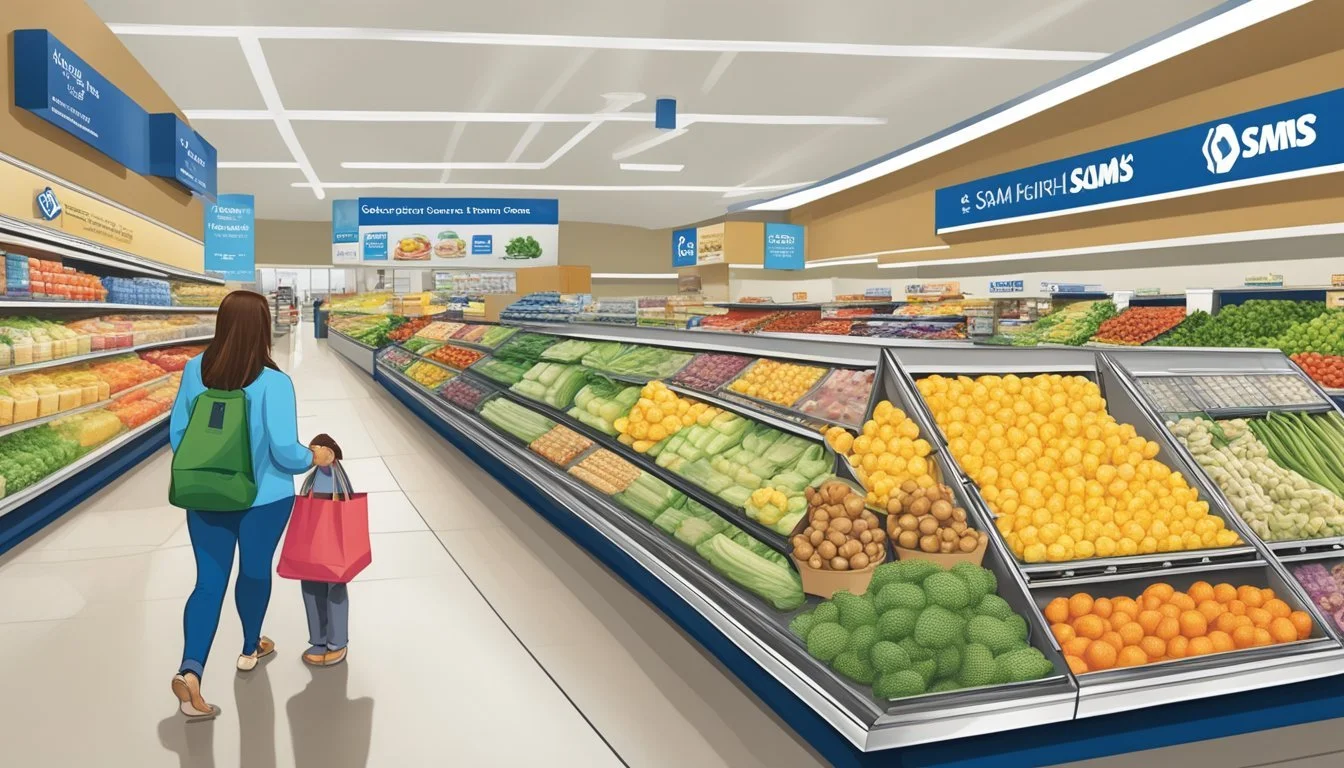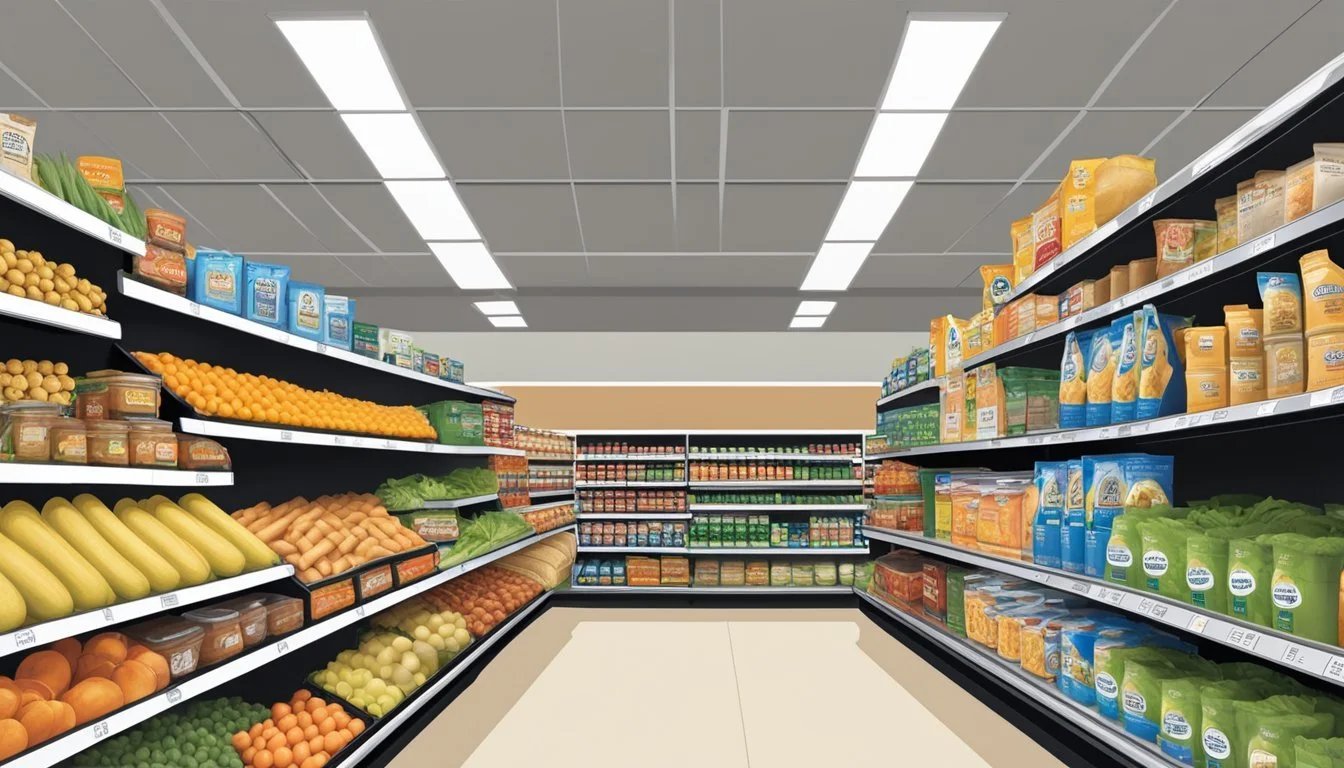Is Food Lion Cheaper Than Sam's Club?
A price comparison of two popular grocery chains
Price-conscious shoppers often compare grocery stores to find the best deals. Food Lion and Sam's Club are two popular options, each with its own pricing strategies and product offerings. While both aim to provide value, their approaches differ significantly.
Generally, Sam's Club offers lower prices on many items compared to Food Lion, especially for bulk purchases. Sam's Club's membership-based warehouse model allows for significant discounts on large quantities, which can lead to substantial savings for customers who buy in volume. However, this advantage may not apply to all products or shopping needs.
Food Lion, as a traditional grocery store, provides a different shopping experience. It offers a wider variety of brands and package sizes, catering to diverse customer preferences. Food Lion's loyalty program and weekly specials can help budget-conscious shoppers save money on regular grocery trips. The choice between these two stores ultimately depends on individual shopping habits, storage space, and specific product needs.
Understanding Grocery Store Pricing
Grocery store pricing involves complex strategies aimed at attracting customers while maintaining profitability. These tactics include competitive pricing, loyalty programs, and private label offerings.
Pricing Strategies of Grocery Stores
Grocery stores employ various pricing techniques to appeal to shoppers. Loss leaders, items priced below cost, draw customers in with the expectation they'll purchase other products. Many stores use dynamic pricing, adjusting prices based on demand, time of day, or competitor rates.
Bulk discounts incentivize larger purchases, while promotional sales create a sense of urgency. Some retailers adopt everyday low pricing, maintaining consistently low prices rather than frequent sales.
Loyalty programs offer personalized discounts to regular customers, encouraging repeat visits. Price matching policies help stores compete directly with local competitors, ensuring customers feel they're getting the best deal.
The Role of Private Labels in Pricing
Private label products, or store brands, play a crucial role in grocery pricing strategies. These items typically cost 20-30% less than national brands, offering value to price-conscious shoppers.
Stores use private labels to:
Increase profit margins
Differentiate themselves from competitors
Provide budget-friendly alternatives
Quality tiers within store brands allow retailers to target different customer segments. Budget lines compete on price, while premium private labels rival national brands in quality and packaging.
Private labels also give stores more control over pricing and promotions, allowing them to respond quickly to market changes or consumer trends.
Bulk Buying vs. Conventional Supermarket Shopping
Bulk purchasing offers potential savings but differs from traditional grocery shopping in several key aspects. The shopping experience, product selection, and pricing structures vary between warehouse clubs and conventional supermarkets.
Overview of Bulk Purchasing Benefits
Bulk buying often leads to lower per-unit costs for groceries and household items. Warehouse clubs like Sam's Club typically offer discounted prices on large quantities. This approach can result in significant savings, especially for non-perishable goods and frequently used products.
Bulk items usually come in larger packages, reducing overall packaging waste. This can be both cost-effective and environmentally friendly. Many shoppers appreciate the convenience of stocking up on essentials, which reduces the frequency of shopping trips.
Quality products are often available in bulk, including name brands and exclusive items. However, bulk buying requires more storage space and upfront costs, which may not suit all households.
Comparing Supermarket Shopping Experiences
Conventional supermarkets like Food Lion offer a different shopping experience. They provide a wider variety of products in smaller quantities, catering to diverse needs and preferences. This allows for more flexibility in purchasing decisions.
Supermarkets typically have more frequent sales and promotions on individual items. They offer loyalty programs and accept manufacturer coupons, which can lead to additional savings. The ability to buy smaller quantities is beneficial for trying new products or purchasing perishables.
Product labeling and packaging in supermarkets are often more detailed and consumer-friendly. This can be helpful for those with specific dietary needs or preferences. Supermarkets also tend to have more convenient locations and longer operating hours compared to warehouse clubs.
Pricing structures differ, with supermarkets focusing on competitive pricing for individual items rather than bulk discounts. This can be advantageous for shoppers who prefer to buy only what they need or have limited storage space.
Comparative Analysis of Food Lion and Sam's Club
Food Lion and Sam's Club offer distinct shopping experiences with different pricing models, product selections, and store formats. Their approaches to store brands, national brands, and product variety impact overall value for consumers.
Store Brands and National Brands
Food Lion features its own store brands like Nature's Promise and Taste of Inspirations alongside national brands. These private labels offer cost savings compared to name brands.
Sam's Club carries its Member's Mark private label across many categories. The warehouse club also stocks bulk sizes of popular national brands at competitive prices.
Both retailers use their store brands to provide value, but Sam's Club's bulk packaging often results in lower per-unit costs for both private label and national brand items.
Product Variety and Selection
Food Lion provides a typical supermarket assortment with fresh produce, meats, dairy, and packaged goods. Its stores stock a range of national brands in standard sizes.
Sam's Club offers a more limited selection but in larger quantities. Its meat department features bulk packs and larger cuts. The produce section stocks larger bags and crates of fruits and vegetables.
Sam's Club carries more non-food items like electronics and furniture. Food Lion focuses primarily on groceries and household essentials.
Organic options are available at both retailers, though Food Lion may have a wider everyday selection in this category.
Membership Model and Pricing
Sam's Club and Food Lion employ distinct pricing strategies. Sam's Club operates on a membership-based model, while Food Lion offers traditional grocery shopping without membership requirements. This difference impacts pricing structures and potential savings for consumers.
Understanding Club Memberships and Fees
Sam's Club offers two membership tiers: Club and Plus. The Club membership costs $45 annually, while the Plus membership is priced at $100 per year. These fees grant access to Sam's Club's warehouse-style stores and bulk purchasing options.
Food Lion, in contrast, does not charge membership fees. Customers can shop freely without annual commitments.
The Sam's Club Plus membership provides additional perks, such as early shopping hours and cash back rewards on qualifying purchases. This enhanced tier aims to offer greater value for frequent shoppers.
Cost-Benefit Analysis for Shoppers
For consumers considering Sam's Club membership, the potential for significant savings through bulk purchases must be weighed against the annual fee. Families or individuals who buy in large quantities may find the membership cost offset by lower per-unit prices.
Sam's Club's bulk pricing can lead to savings on many items compared to traditional grocery stores like Food Lion. However, shoppers must factor in the membership fee when calculating overall savings.
Food Lion's lack of membership fees means no upfront costs for shoppers. This model suits customers who prefer smaller, more frequent purchases or those who don't require bulk quantities.
Ultimately, the cost-effectiveness depends on individual shopping habits, household size, and storage capacity. Frequent bulk buyers may benefit more from Sam's Club, while those preferring traditional grocery shopping might find Food Lion more suitable.
Evaluating Savings and Value
Comparing prices and assessing quality are crucial when determining the better value between Food Lion and Sam's Club. Each store offers unique advantages that can impact overall savings for shoppers.
Price Comparison Methodology
Accurate price comparisons between Food Lion and Sam's Club require careful consideration of several factors. Unit pricing is essential, as Sam's Club often sells larger quantities. Shoppers should calculate the cost per ounce or item to make fair comparisons.
Membership fees must be factored in for Sam's Club, potentially affecting overall savings. Food Lion's loyalty program offers discounts without a fee. Seasonal sales and promotions can significantly impact prices at both stores.
Regular price checks on commonly purchased items provide the most reliable data for comparison. Online tools and apps can help track prices over time for a more comprehensive analysis.
Quality Versus Cost Considerations
While price is important, quality plays a crucial role in determining true value. Sam's Club often carries name-brand products in bulk, potentially offering better quality at lower per-unit costs. Food Lion provides a mix of national brands and private-label options.
Store brands from both retailers can offer good quality at competitive prices. Sam's Club's Member's Mark and Food Lion's Nature's Promise lines are examples of cost-effective alternatives to national brands.
Perishables like produce and meat should be evaluated for freshness and quality alongside price. Sam's Club's bulk packaging may lead to waste for smaller households, affecting overall value.
Non-food items like household goods and electronics may offer significant savings at Sam's Club, while Food Lion focuses primarily on groceries.
Shopping Strategies to Maximize Savings
Smart shopping techniques can significantly reduce grocery expenses at both Food Lion and Sam's Club. Leveraging deals and buying in bulk are key ways to stretch your budget further.
Making the Most of Deals and Discounts
Food Lion offers weekly specials and digital coupons through their MVP Card program. Check their weekly ad and app for the latest savings opportunities. Sign up for email alerts to stay informed about upcoming promotions.
Sam's Club provides instant savings offers to members, often on everyday essentials. Their Scan & Go app allows for easy price checking and a quicker checkout process. Look for limited-time offers and seasonal sales for extra discounts.
Both stores frequently run buy-one-get-one deals on popular items. Stock up on non-perishables during these promotions to save long-term. Compare unit prices carefully, as sale items may not always offer the best value.
Effective Bulk Buying Tips
Sam's Club excels in bulk offerings, but smart shoppers can find bulk savings at Food Lion too. Create a shopping list focused on frequently used items to avoid overbuying.
Consider storage space and expiration dates when purchasing large quantities. Divide bulk purchases with friends or family to maximize savings without waste. Freeze perishables like meat and bread to extend shelf life.
Non-food items like cleaning supplies and paper products often provide the best bulk value. Calculate the per-unit cost to ensure bulk purchases truly save money. Remember that Sam's Club requires a membership fee, which should be factored into overall savings calculations.
Consumer Considerations and Choices
When deciding between Food Lion and Sam's Club, shoppers must weigh several key factors. These include the stores' locations, convenience, customer service, and overall shopping experience.
Location and Convenience Factor
Food Lion boasts numerous locations across the southeastern United States, making it easily accessible for many consumers. The chain's smaller store formats allow for quick trips and convenient neighborhood shopping.
Sam's Club, with fewer locations, typically requires a longer drive for most customers. However, its larger stores offer one-stop shopping for bulk purchases.
Families and individuals must consider their shopping habits and proximity to each store. Those who prefer frequent, smaller trips may find Food Lion more convenient. Consumers who shop less often but buy in larger quantities might prefer Sam's Club.
Customer Service and Shopping Experience
Food Lion emphasizes a personalized shopping experience with helpful staff and a familiar layout. Its smaller stores can be easier to navigate, saving time for busy customers.
Sam's Club offers a different experience with its warehouse format. Members appreciate the wide aisles and bulk displays. The club provides product samples and demonstrations, enhancing the shopping experience.
Both stores strive for quality customer service, but in different ways. Food Lion focuses on community connections and everyday needs. Sam's Club aims to create value through its membership model and bulk-buying options.
Consumers should consider their preferences for store atmosphere and the level of assistance they typically require while shopping.
The Impact of Market Trends on Pricing
Market dynamics significantly influence pricing strategies in the grocery industry. Competitive pressures and technological advancements shape how supermarket chains set their prices and compete for customers.
Grocery Industry Competitive Landscape
The East Coast grocery market is fiercely competitive. Food Lion faces stiff competition from regional players like Winn-Dixie and national giants such as Walmart and Kroger. These chains constantly adjust prices to attract budget-conscious shoppers.
Price comparisons reveal minimal differences between major retailers. For example, a market basket study showed only a $0.07 difference between Kroger and Food Lion for a 38-item grocery list.
Trader Joe's unique product offerings allow it to maintain slightly higher prices while still attracting customers. Discount chains like Aldi put pressure on traditional supermarkets to keep prices low.
E-commerce Influence on Supermarket Chains
Online grocery shopping has transformed the industry. Amazon's entry into the market with Amazon Fresh has forced traditional chains to improve their digital presence and delivery options.
Many supermarkets now offer online ordering and curbside pickup to compete with e-commerce giants. This shift has led to more transparent pricing as consumers can easily compare costs across multiple retailers.
Some chains, including Giant Food, have announced price reductions on popular items to remain competitive in the digital space. The ability to quickly adjust prices online allows for more dynamic pricing strategies.
E-commerce has also increased price sensitivity among consumers, who can now easily compare prices across multiple stores with a few clicks.








